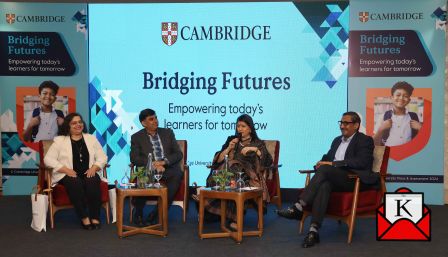Integrated Learning & Assessment To Make Young Students Future Ready


Cambridge University Press & Assessment created its Integrated Learning and Assessment (ILA) program to give students the necessary future abilities for a competitive global environment. The goal of this program is to give children in grades 1–8 a comprehensive English language education. ILA is part of Cambridge’s other future skills programs, such as Young Pioneers and Cambridge Climate Quest, which prepare students for a globalized society.
Students in grades 1–8 can benefit from a unified English language learning experience thanks to the new ILA program, which is in line with both national (NCF 2022-23) and international (CEFR) standards.ILA encourages the development of LSRW (listening, speaking, reading, and writing) skills and holistic language acquisition by reorienting the focus from evaluation of learning to assessment of learning. It ensures comprehensive skill by integrating curriculum-aligned content with international standards.
This program, which is in line with the Common European Framework of Reference for Languages (CEFR), the National Curriculum Frameworks 2022 and 2023, and NEP, lays out a learning path that combines national and international educational standards to guarantee a comprehensive education that will enable students to succeed in a global setting. The goal of this practice-based approach is to enable students to improve their English language proficiency in everyday situations.
Students who are exposed to a distinctively varied variety of texts are better prepared for success in the future, especially when it comes to competency-based exams at the Board level. Additionally, the Practice Books offer focused training for the Cambridge English Qualifications. ILA emphasizes skill-driven knowledge in addition to standard activities in the classroom. It focuses on using language learning activities to close the gap between in-class and at-home learning. Both CGO access and home access to the CEC pages are used for the reinforcement. Checklists for learning outcomes are offered to support continuous evaluation and improvement of the efficacy of instruction. They give teachers the ability to track students’ development and modify their teaching methods as necessary. There are pre-made competency-based tests available to expedite the assessment procedure and give a comprehensive picture of students’ grip over key skills.
With an emphasis on communication, entrepreneurship, and climate literacy, Cambridge’s future skills efforts or initiatives seek to give students the tools they need for the future. To promote creativity and entrepreneurial abilities, the Young Pioneers program (grades 7–10) blends curriculum-based instruction with masterclasses, mentorship, and projects. In addition, Cambridge Climate Questis integrates climate education across a variety of courses, emphasizing practical applications and grassroots engagement, to foster climate awareness, literacy, and action among young learners, especially those in Grades 8 through 12.
For more information: https://www.cambridge.org/
Priyanka Dutta
